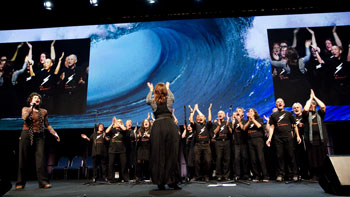
FOR MANY people music has the power to transform their mood, remind them of special events and even uplift their soul.
Dr Felicity Baker, Director of Research of the School of Music at The University of Queensland, said there is clinical proof that music can make you happy and improve wellbeing.
A music therapist, Dr Baker has spent 20 years working with people with brain injuries and using music to improve their
health and wellbeing.
She told people at the Happiness and its Causes conference about some exciting research released in Finland last year.
“There is a fantastic study that shows that patients who have had strokes and have damaged parts of their brain, just actively listening to music improves their cognition and their ability to think.”
Dr Baker has an interest in the therapeutic value of song writing and has used it in her work.
“As people tell their stories through music they are able to process different aspects of grief that they might be experiencing as well as joy.”
Ben Pennings also experiences this first-hand.
The Community Development Coordinator for Reclink Australia and founder and manager of the Transformers Choir (Brisbane’s Choir of Hard Knocks) knows the power of music.
“Our aim isn’t happiness, our aim is to come together,” he said.
The choir is mostly made up of people with mental health issues, people experiencing marginalisation and their carers.
“It is about supporting people through all the different stages of their life,” he told conference attenders.
“We want to give the gift of music.
“We’re not the Tabernacle Choir but what we can give is energy and love and show happiness and enjoyment of the opportunities we have been given.”
Lifeline’s Brian Procopis is the group’s master songwriter and works with choir members to develop original songs from their experiences.
“Often it turns out to be the most extraordinary song,” said Mr Pennings.
Adrianne Dempster leads the choir at Blue Care’s Erowal Aged Care Facility in Maleny.
Residents, staff , volunteers and family members come together once a week to sing as a choir.
“The intention was not just to have a sing-along, but to enjoy singing with the slightly added challenge and gentle discipline of simple choral work,” she said.
Since its beginning in October 2010, the choir now has three accompanists and use of a pianola (a gift to the facility by a Maleny resident).
Singers consist of up to 21 residents, four staff members, nine volunteers and three family members.
“It’s not unlike a wheel-chair relay as the volunteers and staff bring the singers in from all directions,” said Ms Dempster.
A retired Uniting Church minister, Ms Dempster said she and her husband, Chaplain at Erowal, felt the choir was a very
special activity.
“I am blessed to be able to attend to the nurture of the whole person and this extended way,” she said.
“I am convinced of the therapeutic efficacy of singing in a group such as this.
“We laugh a lot.
“We find residents singing along the corridors as they return to their rooms after choir.
“Last Tuesday, a 98-year old resident seemed somewhat disengaged but then tuned in to sing all of ‘Wouldn’t it be Loverly’ and ‘Maori Farewell’.
“Two stroke sufferers, who can barely speak, sing regularly and one of them has taken to conducting, keeping very good
time as well.
“One new member comes complete with oxygen tank between his knees.”
In March the choir put on their first recital.
“It was a marathon effort for staff to get many of the residents ready, but we did it.
“There were special moments seeing the residents’ delight at the applause their singing generated (and deserved).”
The choir is now working towards repertoire for another recital in October.
Photo : The Transformers choir performs with Deborah Conway at the Happiness and its Causes conference in Brisbane in June. Photo by Brendan Read
 JourneyOnline
JourneyOnline






